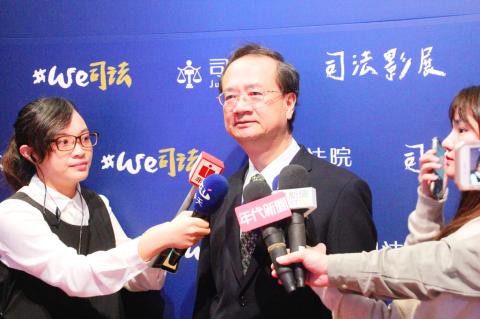Any law that follows from the passage of referendums initiated by groups opposed to same-sex marriage cannot contradict the Council of Grand Justices’ Interpretation No. 748, as it came from the highest ranks of the legal hierarchy, the Judicial Yuan said yesterday.
Interpretations from the grand justices have equal legal weight as the Constitution, Judicial Yuan Secretary-General Lu Tai-lang (呂太郎) told a meeting of the legislature’s Judiciary and Organic Laws and Statutes Committee in Taipei.
Although two referendums were passed that oppose amending the Civil Code to allow for same-sex marriage, the Legislative Yuan cannot pass laws that oppose the interpretation, Lu said.

Photo: Wu Cheng-feng, Taipei Times
The decision delivered on May 24 last year states that provisions in the Civil Code that define marriage as between a man and a woman contravene the Constitution, and required that new regulations be introduced within two years to protect marriage equality.
All three referendums initiated by the Coalition for the Happiness of Our Next Generation were passed on Saturday.
They proposed excluding education about gay people from elementary and junior-high schools, restricting the Civil Code’s definition of marriage to a union between a man and woman, and drafting a separate law to protect same-sex marriage.
Two referendums supporting the inclusion of same-sex marriage in the Civil Code and the teaching of gender-equality education in elementary and junior-high schools were rejected.
Executive Yuan spokeswoman Kolas Yotaka on Sunday said that the government would draft a separate law in three months to extend equal marriage rights to same-sex couples.
Separately yesterday, Judicial Yuan President Hsu Tzong-li (許宗力) on the sidelines of the opening of a film festival in Taipei offered words of encouragement to the nation’s LGBT community.
After the referendum results were announced, the Judicial Yuan heard from some LGBT people who had contemplated suicide because of the results, Hsu said.
“I want to use this opportunity to call on people who supported the failed pro-LGBT referendums to not lose their spirit, to be emotionally strong and to not feel disappointed,” Hsu said.
The rights of the LGBT community have already been protected by the interpretation, which would not be affected by the referendums, he added.
However, the referendum results would have a legally binding effect on the administrative and legislative branches of the government, which might have to protect marriage equality via a separate law, Hsu said.
A separate law would not necessarily afford unequal treatment to the LGBT community, as it would depend on its content, he added.

CHAOS: Iranians took to the streets playing celebratory music after reports of Khamenei’s death on Saturday, while mourners also gathered in Tehran yesterday Iranian Supreme Leader Ayatollah Ali Khamenei was killed in a major attack on Iran launched by Israel and the US, throwing the future of the Islamic republic into doubt and raising the risk of regional instability. Iranian state television and the state-run IRNA news agency announced the 86-year-old’s death early yesterday. US President Donald Trump said it gave Iranians their “greatest chance” to “take back” their country. The announcements came after a joint US and Israeli aerial bombardment that targeted Iranian military and governmental sites. Trump said the “heavy and pinpoint bombing” would continue through the week or as long

TRUST: The KMT said it respected the US’ timing and considerations, and hoped it would continue to honor its commitments to helping Taiwan bolster its defenses and deterrence US President Donald Trump is delaying a multibillion-dollar arms sale to Taiwan to ensure his visit to Beijing is successful, a New York Times report said. The weapons sales package has stalled in the US Department of State, the report said, citing US officials it did not identify. The White House has told agencies not to push forward ahead of Trump’s meeting with Chinese President Xi Jinping (習近平), it said. The two last month held a phone call to discuss trade and geopolitical flashpoints ahead of the summit. Xi raised the Taiwan issue and urged the US to handle arms sales to

BIG SPENDERS: Foreign investors bought the most Taiwan equities since 2005, signaling confidence that an AI boom would continue to benefit chipmakers Taiwan Semiconductor Manufacturing Co’s (TSMC, 台積電) market capitalization swelled to US$2 trillion for the first time following a 4.25 percent rally in its American depositary receipts (ADR) overnight, putting the world’s biggest contract chipmaker sixth on the list of the world’s biggest companies by market capitalization, just behind Amazon.com Inc. The site CompaniesMarketcap.com ranked TSMC ahead of Saudi Aramco and Meta Platforms Inc. The Taiwanese company’s ADRs on Tuesday surged to US$385.75 on the New York Stock Exchange, as strong demand for artificial intelligence (AI) applications led to chip supply constraints and boost revenue growth to record-breaking levels. Each TSMC ADR represents

State-run CPC Corp, Taiwan (CPC, 台灣中油) yesterday said that it had confirmed on Saturday night with its liquefied natural gas (LNG) and crude oil suppliers that shipments are proceeding as scheduled and that domestic supplies remain unaffected. The CPC yesterday announced the gasoline and diesel prices will rise by NT$0.2 and NT$0.4 per liter, respectively, starting Monday, citing Middle East tensions and blizzards in the eastern United States. CPC also iterated it has been reducing the proportion of crude oil imports from the Middle East and diversifying its supply sources in the past few years in response to geopolitical risks, expanding